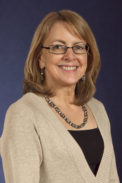By Christopher White, The Tablet’s National Correspondent
As a young student studying social work at the University of Iowa, Joan Rosenhauer dedicated her spare time to community organizing, and was pleasantly surprised to find out that her very own Catholic Church was one of the world’s largest responders to human need around the world.

Despite being raised Catholic, Rosenhauer, who has been appointed as the new executive director of Jesuit Refugee Service USA (JRS/USA), said that it was “eye-opening” to realize “just how many programs” and initiatives the Catholic Church runs, particularly through the Catholic Campaign for Human Development (CCHD), the domestic anti-poverty program of the United States Conference of Catholic Bishops (USCCB).
Her appointment serves as a one-two punch of sorts, coming at a time in which more than 65 million refugees are currently displaced around the world, and also when the topic of women’s leadership within the Church continues to dominate conversation.
And to punctuate it further, the announcement of Rosenhauer’s new post was timed to coincide with International Women’s Day, March 8, with JRS/USA boasting that she would become the first woman to be named the organization’s executive director.
Founded in 1980 as a response to the crisis of Vietnamese refugees, JRS/USA has a three-pronged mission to support refugees as they heal, learn, and thrive. JRS/USA is not a refugee resettlement program, but instead works to advocate for their rights and aid them as they adjust to new environments.
Soon after Rosenhauer finished her master’s work in public policy management at the University of Maryland, she began work for the Archdiocese of Washington and the USCCB, before joining Catholic Relief Services (CRS) as its executive vice president for U.S. operations in 2009.
Looking back on her time at CRS, she said that one of the most memorable moments came in Rwanda in 2012. There, she recalls observing a local reconciliation effort at a Catholic parish taking place after the country’s 1994 genocide where, by some estimates, up to 1 million Rwandans were slaughtered.
One young woman, Annunciata, introduced herself to the group by explaining that her entire family had been killed in the genocide and she was the sole survivor. The individual next to her then introduced himself to the group as the man who had killed Annunciata’s family.
Rosenhauer recalls being overwhelmed with emotion – both at the courage and humility of these individuals to sit side by side and promote forgiveness, but also in gratitude as she realized, “our Church, through Catholic Relief Services, was able to facilitate this.”
Looking ahead to her new role, , she says she is not Pollyannaish about the challenges that await her in a country divided over national policies toward refugees.
Even so, however, she is convinced that Catholics can and must be persuaded to offer a spirit of hospitality and welcome.
Noting that the vast numbers of refugees that are resettled in the United States are minors, she asks, “What kind of Church would we be if we don’t care for these children?”
For someone who has spent her life working in the Church, and specifically in its social ministry programs, she says that having Pope Francis leading the global Church over the past five years has “absolutely been a booster shot for me.”
She told Crux that it’s obvious that the issues that she’s spent her career working on are “also very close to his heart,” and that he’s managed to shake the conscience of the world from complacency when it comes to marginalized individuals.
“He helps people see that these are our brothers, these are our sisters,” said Rosenhauer.
